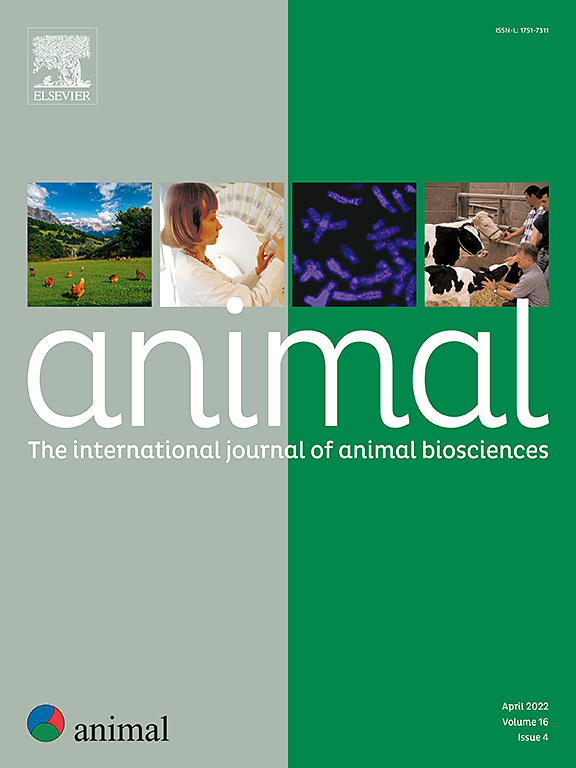Social aspects of integrated crop-livestock systems: key for future policy
IF 4.2
2区 农林科学
Q1 AGRICULTURE, DAIRY & ANIMAL SCIENCE
引用次数: 0
Abstract
The regional integration of crop and livestock production systems (ICLS) has been proposed as a solution towards a more sustainable and circular food system. Studies on ICLS, however, tend to focus on the agronomical consequences of such collaborations, with little insight into the influence of social aspects (e.g., policies, trust) on the development of ICLS. This study aims to enhance understanding concerning the role of social aspects in collaborations between arable and dairy farms. We apply a conceptual framework distinguishing (1) external factors, (2) internal factors related to the characteristics of the actors involved, and (3) internal factors related to the organisation and management of collaborations. The analysis draws on interviews with 20 farmers and three farm consultants. The interviewees are involved in nine arable-dairy farm collaborations that are based on land exchange and are located in five different regions across the Netherlands. The interviews were conducted between October 2022 and September 2023. Two main external factors that influence collaborations were identified. According to interviewees, agricultural policies and markets focus on individual farms and are sector-specific. These perceptions lead them to regard that policies and markets fail to recognise ICLS practices, and might even obstruct them. The collaborations studied both influenced and were influenced by regional culture, unwritten rules, and a certain level of social control. We further identify four main internal factors that influence collaborations. With regard to actor-related factors, farmers must have the right attitude towards collaboration. Interviewees indicated that collaborators should understand the reasons and motivations behind the specific farm management choices of their collaboration partners, as well as their working methods and the regulations to which they must adhere. Mutual trust between collaborators is essential to good collaboration. With regard to factors relating to organisation and management, a fair distribution of risks and benefits in the long term is key for a successful collaboration. Moreover, the farms in a collaboration develop a mutual dependency that tends to increase over time. Self-reinforcing mechanisms or feedback loops strengthen the influence of certain social factors such as trust and mutual dependency. The identification of these aspects across collaborations highlights the importance of integrating both the environmental and social components of collaborations in policies for the further development of ICLS. We conclude that policies should consider the regional social context and its diversity, must have a cross-sectoral focus, and that organising collaborations takes time.
作物-牲畜综合系统的社会方面:未来政策的关键
作物和牲畜生产系统的区域一体化(ICLS)已被提议作为实现更可持续和循环的粮食系统的解决方案。然而,对ICLS的研究往往侧重于这种合作的农学后果,而很少深入了解社会方面(如政策、信任)对ICLS发展的影响。本研究旨在增进对社会方面在耕地和奶牛场合作中的作用的理解。我们采用了一个概念框架来区分(1)外部因素,(2)与参与者特征相关的内部因素,以及(3)与合作组织和管理相关的内部因素。该分析基于对20名农民和3名农场顾问的采访。受访者参与了九个以土地交换为基础的可耕种奶牛场合作,这些合作位于荷兰的五个不同地区。这些采访是在2022年10月至2023年9月期间进行的。确定了影响合作的两个主要外部因素。根据受访者的说法,农业政策和市场侧重于个体农场,并针对特定部门。这些看法导致他们认为,政策和市场不承认ICLS的做法,甚至可能阻碍它们。研究的合作既受地域文化、不成文规则和一定程度的社会控制的影响,也受其影响。我们进一步确定了影响合作的四个主要内部因素。在行动者相关因素方面,农民必须有正确的合作态度。受访者表示,合作者应该了解其合作伙伴具体农场管理选择背后的原因和动机,以及他们的工作方法和必须遵守的法规。合作者之间的相互信任对于良好的合作至关重要。关于组织和管理方面的因素,长期的风险和利益的公平分配是成功合作的关键。此外,合作中的农场会发展出一种相互依赖,这种依赖会随着时间的推移而增加。自我强化机制或反馈循环加强了某些社会因素的影响,如信任和相互依赖。通过合作确定这些方面,突出了将合作的环境和社会组成部分纳入ICLS进一步发展政策的重要性。我们的结论是,政策应该考虑区域社会背景及其多样性,必须有一个跨部门的焦点,组织合作需要时间。
本文章由计算机程序翻译,如有差异,请以英文原文为准。
求助全文
约1分钟内获得全文
求助全文
来源期刊

Animal
农林科学-奶制品与动物科学
CiteScore
7.50
自引率
2.80%
发文量
246
审稿时长
3 months
期刊介绍:
Editorial board
animal attracts the best research in animal biology and animal systems from across the spectrum of the agricultural, biomedical, and environmental sciences. It is the central element in an exciting collaboration between the British Society of Animal Science (BSAS), Institut National de la Recherche Agronomique (INRA) and the European Federation of Animal Science (EAAP) and represents a merging of three scientific journals: Animal Science; Animal Research; Reproduction, Nutrition, Development. animal publishes original cutting-edge research, ''hot'' topics and horizon-scanning reviews on animal-related aspects of the life sciences at the molecular, cellular, organ, whole animal and production system levels. The main subject areas include: breeding and genetics; nutrition; physiology and functional biology of systems; behaviour, health and welfare; farming systems, environmental impact and climate change; product quality, human health and well-being. Animal models and papers dealing with the integration of research between these topics and their impact on the environment and people are particularly welcome.
 求助内容:
求助内容: 应助结果提醒方式:
应助结果提醒方式:


